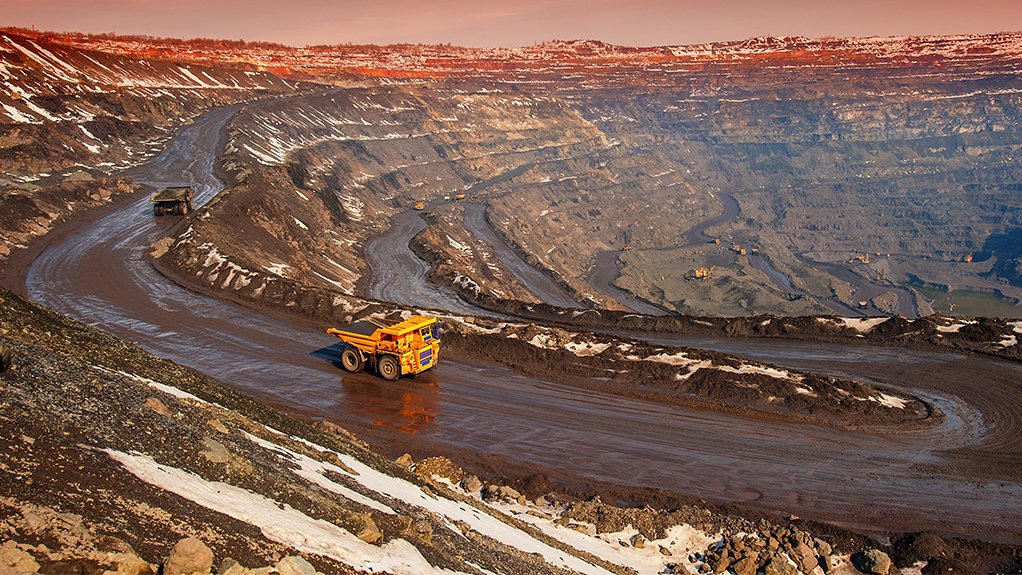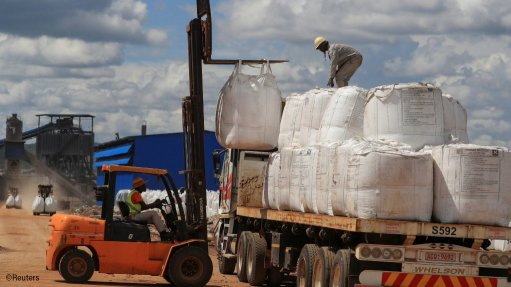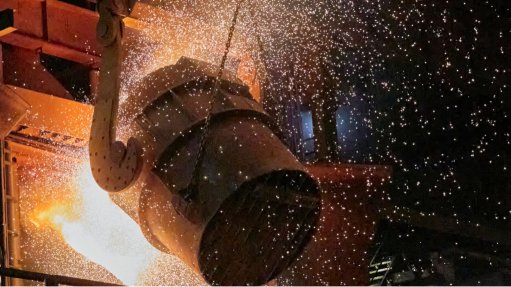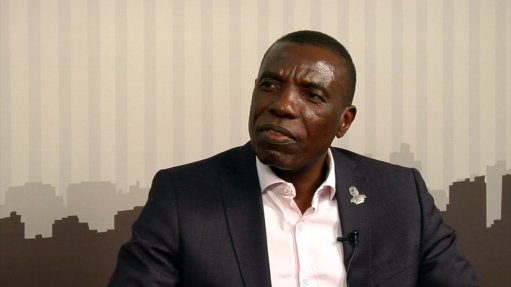Opportunities unlocked through addressing fundamentals


EXPORT IMPACT Challenges have affected South African iron-ore producers over the past two years with lower-than-expected export volumes
While it is home to several significant iron-ore producers, amid the opportunities within the African iron-ore industry, there are also significant challenges, as all bulk material operations require reliable rail and port logistical infrastructure to transport iron-ore from mining sites to the point of sale, reports mining services provider Ukwazi MD Jaco Lotheringen.
He notes the challenges faced by the sector have affected South African iron-ore producers over the past two years with lower-than- expected export volumes, mostly as a result of issues with State-owned logistics company Transnet.
Lotheringen says that substantial investment in rail and port infrastructure is critical to facilitate any growth in the iron-ore sector, adding that individual jurisdictions also have their own unique challenges such as geopolitical risks, asset and personnel security, food and energy security and resource nationalism.
Further, he laments that, generally, volatile commodity prices are now “the order of the day” since the commodity crisis in 2015, meaning that when combined with the upward pressure on mining production costs since the Covid-19 pandemic, additional strain is added to the operating margins of iron-ore producers, in general.
Minerals exploration, meanwhile, is another major challenge in the industry as exploration activities in Africa and globally have been steadily decreasing.
Lotheringen points out that, according to insights, data and technology company S&P Global Market Intelligence’s report for July 2023, the two regions attracting the highest exploration expenditure were the US and Australia; however, the exploration budget devoted to Africa has been declining steadily over the past five years, with Africa attracting less than 1% of global exploration spend, albeit gold exploration being the exception.
“A different way of understanding is to compare the number of junior miners, who are the key drivers of exploration, who list on the JSE or Alt-X, and to compare them to those who list on the Canadian or Australian main, alternative or venture capital boards,” Lotheringen comments.
In this vein, he highlights that according to comments made by mining employers’ organisation Minerals Council South Africa former CEO Dr Roger Baxter at the Junior Mining Indaba in June, Canada has about 1 200 junior miners listed on the country’s stock exchange, while Australia has about 700. Lotheringen says South Africa has fewer than 12.
“The value chain of juniors exploring for assets and selling them to major miners simply is not working,” he stresses.
Guinea, in particular, has been a focus for iron-ore development, highlights Lotheringen, referencing diversified miner Rio Tinto’s Simandou project, in Guinea, as one of the world's largest untapped high-grade iron-ore deposits.
He explains that various international mining companies have expressed interest in developing iron-ore resources, most notably Rio Tinto in conjunction with government and Chinese partners, potentially transforming Guinea into a major iron-ore exporter.
Further, as in many mining regions, concerns about the environmental impact and the wellbeing of local communities are central to discussions surrounding the iron-ore industry in South Africa and, more broadly, in Africa.
In this regard, ensuring sustainable and responsible mining practices are growing priorities for many stakeholders, Lotheringen adds.
Exploration Impetus
South Africa’s minerals industry requires increased exploration activity and investment, especially from major mining companies, he comments.
Lotheringen highlights that Ukwazi has been “intimately involved” in a programme by a major iron-ore producer in the Northern Cape to promote the junior mining industry and assisting them with skills and expertise in administration-intensive tasks such as mineral rights applications, environmental- impact assessments, mine work programmes and, in some cases, assessing trade studies and engineering solutions for bulk materials handling and rapid loadout stations.
In addition, “Africa’s iron-ore industry would be better served if there was greater focus on ensuring appropriate cadastral systems, ease of business and greater investment in infrastructure”, he says
Economy Grower
Lotheringen explains that the iron-ore industry can be a significant contributor to the economies of African countries as revenue generated from iron-ore exports can be used to fund infrastructure development, education, healthcare and to uplift local communities, among other economic growth avenues.
Meanwhile, geopolitical factors – such as the war in Ukraine and the Middle East, as well as trade relations with major consumers like China – bring significant uncertainty to the markets, he highlights.
This uncertainty also affects the African iron-ore industry, says Lotheringen, adding that the impact on iron prices is closely correlated to the steel manufacturing and construction industry in China.
“It is important to note that the state of the iron-ore industry can vary significantly from one African country to another, and it is subject to changes in global market conditions,” he says.
Nonetheless, despite these challenges, Lotheringen notes that there has been an upswing in the establishment of smaller iron-ore producers over the past few years, specifically in the Northern Cape province of South Africa.
“Based on the significant incremental cost of road transport and declining conditions of road infrastructure, a lot of these startups rely on established operators for access to rail and port allocations. This seems to be a short-term mutually-beneficial arrangement for the time being, creating value for all stakeholders,” he says.
However, in the vacuum of few significant exploration activities and poor access to public funding, the sustainability of these smaller iron-ore producers, and their ability to grow, “remains to be seen”, states Lotheringen.
He concludes that with appropriate access to public funds and the certainty and transparency that this brings, smaller iron-ore producers could have been in a stronger position relative to where they find themselves currently.
Article Enquiry
Email Article
Save Article
Feedback
To advertise email advertising@creamermedia.co.za or click here
Announcements
What's On
Subscribe to improve your user experience...
Option 1 (equivalent of R125 a month):
Receive a weekly copy of Creamer Media's Engineering News & Mining Weekly magazine
(print copy for those in South Africa and e-magazine for those outside of South Africa)
Receive daily email newsletters
Access to full search results
Access archive of magazine back copies
Access to Projects in Progress
Access to ONE Research Report of your choice in PDF format
Option 2 (equivalent of R375 a month):
All benefits from Option 1
PLUS
Access to Creamer Media's Research Channel Africa for ALL Research Reports, in PDF format, on various industrial and mining sectors
including Electricity; Water; Energy Transition; Hydrogen; Roads, Rail and Ports; Coal; Gold; Platinum; Battery Metals; etc.
Already a subscriber?
Forgotten your password?
Receive weekly copy of Creamer Media's Engineering News & Mining Weekly magazine (print copy for those in South Africa and e-magazine for those outside of South Africa)
➕
Recieve daily email newsletters
➕
Access to full search results
➕
Access archive of magazine back copies
➕
Access to Projects in Progress
➕
Access to ONE Research Report of your choice in PDF format
RESEARCH CHANNEL AFRICA
R4500 (equivalent of R375 a month)
SUBSCRIBEAll benefits from Option 1
➕
Access to Creamer Media's Research Channel Africa for ALL Research Reports on various industrial and mining sectors, in PDF format, including on:
Electricity
➕
Water
➕
Energy Transition
➕
Hydrogen
➕
Roads, Rail and Ports
➕
Coal
➕
Gold
➕
Platinum
➕
Battery Metals
➕
etc.
Receive all benefits from Option 1 or Option 2 delivered to numerous people at your company
➕
Multiple User names and Passwords for simultaneous log-ins
➕
Intranet integration access to all in your organisation



















